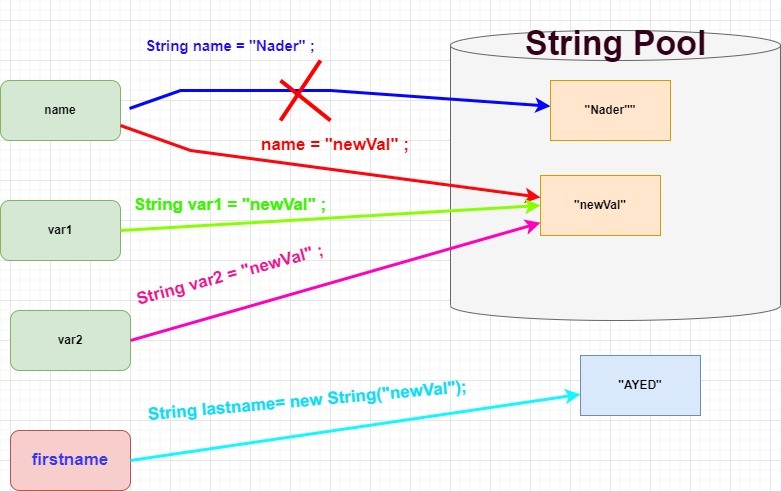Why Are Strings Immutable in Java? Enhancing Code Reliability
Why Are Strings Immutable in Java? Enhancing Code Reliability
Blog Article
What Is Unalterable Strings and Just How It Functions
In the realm of programming, understanding the concept of unalterable strings is paramount for developing durable and safe and secure applications. Immutable strings refer to strings that can not be changed after they are produced, making certain data integrity and predictability within the code. This fundamental principle plays an essential role in numerous shows languages and provides a special strategy to taking care of information. By discovering the ins and outs of exactly how unalterable strings work, one can discover a world of benefits and opportunities that can raise the quality and efficiency of software program advancement.
The Basics of Unalterable Strings
Unalterable strings, as an essential idea in programs, are character sequences that can not be changed as soon as they are produced. This means that as soon as a string is appointed a worth, that value can not be modified. In languages like Python and Java, strings are immutable objects, bring about numerous ramifications in terms of memory management and information honesty.
Among the vital advantages of unalterable strings is that they provide a complacency in data control. Because the web content of an immutable string can not be changed, it makes sure that the initial information remains undamaged, minimizing the risk of unexpected changes throughout program execution (Why are strings immutable in Java?). This residential property also streamlines debugging procedures, as programmers can rely on that once a string is defined, its worth will certainly not be inadvertently changed
When a brand-new string is created based on an existing one, instead than customizing the initial string, the brand-new value is stored separately. In general, recognizing the fundamentals of unalterable strings is important for grasping programs ideas and maximizing code performance.
Benefits of Immutable Strings
Structure upon the safety and security and effectiveness benefits of unalterable strings, their benefits include improving code reliability and simplifying concurrent programming tasks. By being unalterable, strings can not be changed after production, which eliminates the danger of unexpected adjustments in the information they keep. This inherent immutability ensures that as soon as a string is developed, its worth continues to be consistent throughout the program's execution, lowering the opportunities of insects triggered by unforeseen alterations.
Additionally, unalterable strings add to code reliability by making it easier to reason concerning the state of a program. Considering that strings can not be changed, programmers can trust that a string will certainly always hold the very same worth, simplifying debugging and upkeep initiatives. This predictability causes much more steady and dependable codebases.

Application in Programming Languages
Within numerous shows languages, the unification of unalterable strings is a fundamental aspect that affects exactly how information is taken care of and adjusted within code frameworks. The application of unalterable strings differs across different programs languages, with look what i found each language supplying its very own systems to support this idea.

In comparison, languages like C and C++ do not have integrated support for immutable strings. Developers in these languages must manually implement immutability by applying regulations within their code to avoid direct adjustments to string items.
Finest Practices for Functioning With Immutable Strings
When managing immutable strings in shows languages like Java and Python, sticking to best practices makes certain secure and effective information manipulation. Among the vital ideal techniques is to utilize StringBuilder or StringBuffer as opposed to directly manipulating strings, particularly when dealing with extensive concatenation procedures. These courses provide mutable options for string control, helping to prevent unneeded memory allocations and improving efficiency.
One more finest technique is to utilize string interpolation or formatting operates supplied by the language as opposed to hands-on concatenation. This not just enhances readability however additionally help in stopping common challenges such as unintentional string adjustments. Furthermore, when collaborating with sensitive information such as passwords or API tricks, check my source it is critical to avoid saving them as simple message in unalterable strings. Using safe storage space devices like char arrays or specialized libraries for dealing with sensitive information assists alleviate security risks associated with immutable strings.
Real-world Applications and Instances
Exploring functional executions of immutable strings in various industries exposes their substantial effect on information honesty and system reliability. In the medical care market, immutable strings play a crucial function in making sure the safety and security and confidentiality of patient information. By avoiding unauthorized alterations to delicate info such as medical records and prescriptions, unalterable strings assist keep conformity with strict personal privacy laws like HIPAA.
Banks also gain from the immutable nature of strings to enhance the safety and security of consumer data and purchase documents. Unalterable strings help protect against fraud and unauthorized modifications to economic info, offering a durable protection versus cyber dangers and making certain the trust and confidence of clients.

Final Thought
Best practices for working with unalterable strings include avoiding straight adjustments and utilizing methods that return new string objects. Real-world applications of unalterable strings consist of information security, caching, and string adjustment jobs.
Unalterable strings refer to strings that can not be changed after they are developed, making certain information integrity and predictability within the code. When a brand-new string is created based on an existing one, rather than customizing the initial string, the brand-new worth is stored individually.In languages like Java and Python, strings are unalterable by default, implying that as soon as a string item is produced, its worth can not be altered - Why are strings immutable in Java?. Finest methods for functioning with unalterable strings consist of preventing direct modifications and utilizing approaches that return brand-new string items. Real-world applications of unalterable strings consist of information encryption, caching, and string manipulation tasks
Report this page